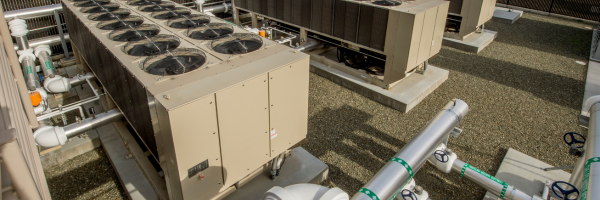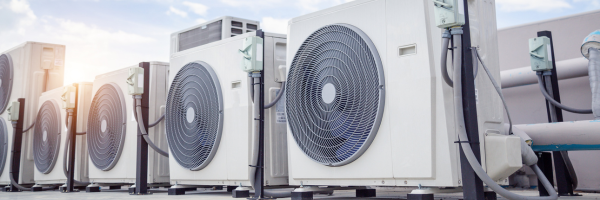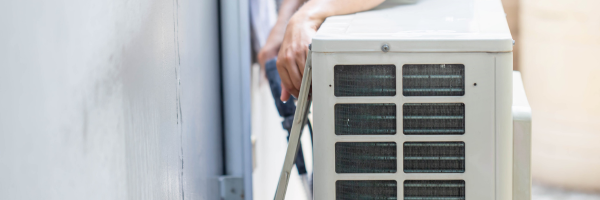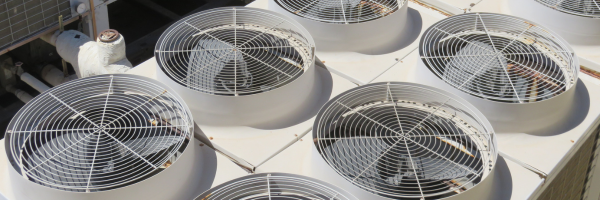Preparing your blog post
Preparing your blog post
In today's industrial, commercial, and data centre environments, reliable cooling is more than just a convenience; it's a necessity. A system failure doesn't just pause operations; it increases energy consumption, risks equipment damage, and drives up operating costs.
In breweries, this can mean the loss of mid-fermentation batches. In plastics manufacturing, production stalls during peak moulding periods, creating waste and delays. Data centres face the threat of SLA breaches, impacting client trust and incurring potential penalties. Data centre environments face unique thermal management challenges and are at risk of performance degradation due to overheating, which can compromise hardware reliability and system uptime.
Operators often underestimate how quickly problems cascade. The challenge of maintaining resilience and preventing performance degradation is especially critical in environments like data centres, where rapid thermal changes can have immediate impacts. Beyond lost production, failures lead to higher energy use, costs, and even reputational damage.
Our 5 R's of Cooling Resilience provides a structured framework to help operators proactively manage these challenges, optimise energy efficiency, and secure high ROI from their cooling infrastructure.

Readiness is about anticipating issues before they happen. It goes beyond simply having a spare chiller on hand. Effective readiness means understanding cooling demand, preparing resources, and ensuring systems are primed for peak performance. Operators should assess their chiller efficiency, check refrigerant levels, and monitor critical components such as compressors and condenser coils. Proper operation of cooling systems is essential to ensure they function efficiently and remain resilient during extreme events.
Being ready also involves confirming that procurement can support rapid deployment, and that staff and contractors are clear on escalation procedures. Sites that plan for readiness are better equipped to maintain cooling capacity, reduce downtime, and prevent unnecessary increases in energy consumption. Adopting best practices for readiness, such as optimised load management and operational procedures, ensures systems are prepared for any scenario.
Resilience focuses on how cooling systems perform when conditions are challenging. Even under extreme conditions or partial failures, resilient systems maintain optimal performance and energy efficiency. A robust cooling system is crucial for withstanding extreme conditions and ensuring continued thermal comfort during events like heatwaves or power outages.
This involves designing systems with redundancy and flexibility, such as variable speed drives, air-cooled chillers, or heat pumps capable of adapting to fluctuating loads. Integrating advanced technologies can further enhance resilience and adaptability, supporting system robustness and energy savings. Free cooling and multi-circuit integration can improve heat transfer, helping maintain chilled water supply without overloading equipment. Systems that appear adequate at idle may underperform under strain, but resilient setups sustain peak efficiency, extend equipment life, and reduce the risk of expensive repairs.
Cooling failures carry both operational and financial consequences. Loss of product, halted production, and regulatory non-compliance are all potential outcomes. Beyond immediate impacts, failures drive up energy use and can increase long-term operating costs if equipment is overworked or poorly maintained. Inefficient systems may require more energy to deliver the same cooling output, which can increase energy consumption and result in higher costs.
Operators should calculate the cost of downtime and understand potential exposure to clients or regulators. Implementing preventive maintenance and investing in energy-efficient cooling solutions reduces risk while ensuring systems remain reliable and cost-effective, helping to reduce expenses over time.
Reputation is built on consistency and reliability. When cooling systems fail, trust is immediately tested. Clients notice missed deliveries, regulators may question compliance, and leadership teams demand accountability.
A strong reputation comes from transparent communication, demonstrated preparedness, and evidence of regular maintenance. Businesses that prioritise building resilience can reassure stakeholders that cooling systems are a strategic asset rather than a liability.
Every cooling decision carries a financial impact. Resilient, energy-efficient, and well-maintained systems deliver measurable ROI by reducing downtime, lowering energy costs, and preventing equipment damage. The benefits of resilient cooling systems include improved efficiency, enhanced reliability, and greater thermal comfort, especially during extreme conditions. Investing in industrial chillers, air conditioning, and modern HVAC systems ensures reliable performance, protects cooling capacity, and supports long-term cost savings.
By adopting our 5 R's framework, operators transform cooling from a hidden operational expense into a source of strategic advantage, efficiency, and high ROI. Investing in advanced technology, such as smart automation and hybrid systems, can further enhance ROI by increasing system adaptability and resilience.

We provide practical tools to help operators implement the 5 R's:
Cooling Resilience Checklist: A 30-point tool to assess readiness, resilience, risk, reputation, and ROI. It highlights potential blind spots in cooling systems and identifies opportunities to reduce energy consumption, optimise cooling energy use, and lower operating costs. Users can access this checklist online or through a subscription for instant evaluation of their systems.
CHILLER Audit: A 30–60 minute strategy session with Jon Keyte, Refcool's Director. Using the CHILLER framework, the audit examines cooling plant capacity, heat transfer efficiency, preventive maintenance, and energy use, while also reviewing the condition and operation of cooling equipment. This provides actionable insights to optimise system performance. No sales pitch, just expert guidance.
We combine decades of hands-on experience with a deep understanding of cooling systems, energy efficiency, and operational resilience. Our approach goes beyond supplying equipment; we provide tailored guidance, practical tools, and proven frameworks to help you optimise performance, reduce energy consumption, and minimise risk.
By partnering with us, you gain access to our expert knowledge, actionable insights, and energy-efficient solutions designed to deliver high ROI and long-term reliability.

Cooling failures do more than stop production; they erode trust, compromise performance, and increase energy costs. By applying the Refcool 5 R's, operators can maintain optimal performance, safeguard equipment, protect company reputation, and achieve significant cost savings through energy-efficient cooling solutions.
With Refcool, operators gain the tools and expertise to turn their cooling systems into a strategic asset that enhances resilience, efficiency, and long-term ROI.
Visit Refcool to learn more.

The Refcool 5 R's are Readiness, Resilience, Risk, Reputation, and ROI. Together, they form a framework designed to help operators anticipate cooling challenges, minimise downtime, and protect both operational performance and business outcomes.
Readiness ensures you have a clear plan in place before failures occur. It's not just about having backup equipment; it's about knowing how quickly you can respond, whether procurement processes support same-day deployment, and whether your team understands the escalation process.
Resilience is about performance under pressure, the ability of your cooling systems to adapt, recover, and maintain output when conditions change. Risk management, on the other hand, focuses on identifying potential failures and assessing their impact. Both are essential, but resilience ensures your system continues to operate even in unexpected situations.
Cooling failures can lead to significant operational, financial, and reputational risks. For example, breweries can lose entire batches, plastics manufacturers may face penalties for off-spec products, and data centres risk breaching client SLAs. The costs go beyond downtime; they can include lost contracts, compliance failures, and reputational damage.
Reputation is built on trust. When cooling systems fail, clients, compliance officers, and leadership teams all demand answers. A well-documented and tested contingency plan protects reputation by showing that the business is prepared, transparent, and proactive in addressing failures.
By reducing downtime, preventing product loss, and avoiding penalties or SLA breaches, the 5 R's framework turns cooling into a strategic asset. It helps operators justify investments, minimise hidden costs, and deliver a measurable return on investment through stronger resilience and risk management.
The Cooling Resilience Checklist is a free 30-point tool developed by Refcool to help technical teams uncover blind spots in their cooling strategy. It covers readiness, resilience, risk, reputation, and ROI, providing practical, real-world questions to test whether your systems and processes are truly prepared.
The CHILLER Audit is a 30- to 60-minute strategic review call with Refcool's Director and lead technical advisor, Jon Keyte. It uses the CHILLER framework to examine contingency, heat load, infrastructure, capacity, lifecycle, efficiency, and review processes. It's not a sales pitch, just an expert-led conversation to highlight risks and opportunities in your setup.